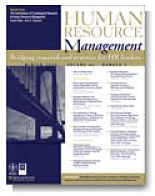Indexes - all Resources
Personality and leadership: a qualitative and quantitative review. (2002)
“After 'extraversion', 'conscientiousness' and 'openness to experience' were the strongest and most consistent correlates of leadership.” Timothy A. Judge, University of Florida; Joyce E. Bono, University of Minnesota; Remus Ilies University of Florida; Megan W. Gerhardt University of Iowa Journal of Applied Psychology, 87(4), 765: 2002 “Of the ...
Written by: Judge, T. A., Bono, J. E., Ilies, R., & Gerhardt, M. W.
Read moreThe long-term organizational impact of destructively narcissistic managers. (2002)
"How to recognize destructively narcissistic managers more quickly and ways other managers, executives, and boards of directors can deal with them Roy Lubit The Academy of Management Executive 16, no. 1 (2002): 127-138 “Destructive narcissism (DN) is both a common and significant problem in organizations. The outward self-confidence, drive for power, and ruthlessness of destructively narcissistic managers (DN managers) facilitat...
Written by: Lubit, Roy.
Read moreA study of impending derailment and recovery of middle managers across career stages. (2000)
"Of particular relevance to ... possible behavioural antecedents of hubris as indicated in linguistic markers, past experiences of success/failure etc. on the part of those coming to positions of business leadership." Frank Shipper, Salisbury State University, Maryland John E. Dillard Jr., President of The Center for Strategic Management & Marketing, Tampa, Florida Human Resource Management Journal, Winter 2000, ...
Written by: Shipper, F., & Dillard, Jr., J. E.
Read more
Napoleon’s tragic march home from Moscow: lessons in hubris. (2000)
"Using historical material on Napoleon as well as contemporary business examples, they examine the causes of hubris and specific leader behaviors that are likely to result. Guidelines for reducing the incidence of hubris are suggested. Mark J. Kroll1, Leslie A. Toombs2 & Peter Wright3 1. professor of management and the George W. and Robert S. Pirtle Distinguished Professor in Free ...
Written by: Kroll, Toombs and Wright.
Read more
Overconfidence: it depends on how, what and whom you ask. (1999)
"Many studies note that peoples’ confidence in their judgments exceeds their accuracy and that overconfidence increases with the difficulty of the task. However, some common analyses confound systematic psychological effects with statistical effects Klayman, J., University of Chicago Soll, J., INSEAD Gonzalez-Vallejo, C., Ohio University Barlas, S., Experian Direct Tech Organizatio...
Written by: Klayman, Soll, Gonzalez-Vallejo and Barlas.
Read more
A motivational model of leadership: predicting long-term management success from TAT measures of power motivation and responsibility. (1999)
"In an AT&T longitudinal study of managers, managerial success after sixteen years is predicted by “responsible power,” which is a combination of TAT-based (Thematic Apperception Test) measures of power motivation and responsibility. David G Winter, University of Michigan The Leadership Quarterly 01/1991; DOI:10.1016/1048-9843(91)90023-U In an AT&T longitudinal study of managers, managerial success ...
Written by: Winter, David G.
Read more
Implicit power motivation moderates men’s testosterone responses to imagined and real dominance success. (1999)
"Individuals high only in p Power had elevated testosterone after imagining a success in a subsequent dominance contest. They continued to have high testosterone levels after actually winning, but not after losing. Oliver C. Schultheiss, Department of Psychology, Harvard University, Kenneth L. Campbell, Department of Biology, University of Massachusetts at Boston, David C. McClelland, Department of Psycholog...
Written by: Schultheiss, Campbell, McClelland.
Read moreThe Living Company: Growth Learning and Longevity in Business. (1999)
"The most enduring companies treat their enterprises as 'living work communities' rather than purely economic machines. Arie de Geus, former head of planning for the Royal Dutch/ Shell Group of companies. "In The Living Company, the man who introduced the revolutionary concept of the learning organization has turned his attention to identifying the critical characteristics of organiza...
Written by: de Geus, Arie.
Read more
Beware the Hubris-Nemesis complex – a concept for leadership analysis
"... introduces the concept of the hubris-nemesis complex .. relatively common, but often unappreciated, and seen in early 1990’s figures such as Fidel Castro, Saddam Hussein, and Slobodan Milosevic David Ronfeldt Prepared for the Office of Research and Development, Central Intelligence Agency Although originally published in 1994, this CIA-funded research by RAND Social Scientist David Ronfeldt warns o...
Written by: Ronfeldt, David.
Read more
The organizational fool: Balancing a leader’s hubris. (1990)
".. explores the role of the sage-fool as means of creating a counter-vailing power against the regressive forces inherent in leadership, in other words, to reinforce the leader's capacity for reality testing Manfred F. R. Kets de Vries, Distinguished Professor of Leadership Development and Organisational Change, INSEAD, Fontainebleau, France. Human Relations, 43(8), 751-770. This paper explores the role of the...
Written by: Kets de Vries, Manfred F. R.
Read more








